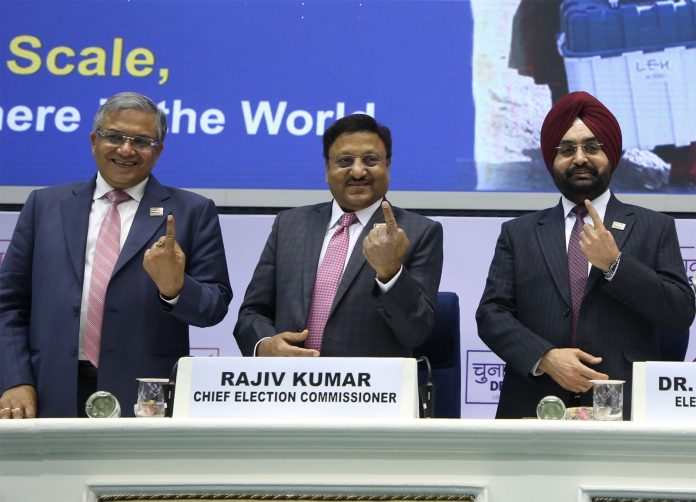Lok Sabha 2024: The 18th Lok Sabha elections are scheduled to be held in seven phases, starting on April 19 and continuing on April 26, May 7, May 13, May 20, May 25, and concluding on June 1.
The Lok Sabha elections, known as the world’s largest polls, are scheduled to take place in seven phases over a span of 44 days starting from April 19. Prime Minister Narendra Modi aims for a third consecutive term in office, while the Opposition INDIA bloc grapples with internal discord. Vote counting is set for June 4.
Chief Election Commissioner Rajiv Kumar announced the poll schedule to elect the 543-member Lok Sabha on Saturday. He stated that more than 97 crore voters, comprising 49.7 crore males and 47.1 crore females, are eligible to cast their votes across 10.5 lakh polling booths.
The Election Commission also announced the assembly election dates for Arunachal Pradesh, Sikkim, Andhra Pradesh, and Odisha. Polling in Arunachal Pradesh and Sikkim will be held on April 19, and in Andhra Pradesh on May 13. In Odisha, the assembly elections will be conducted in four phases on May 13, May 20, May 25, and June 1.
Additionally, bypolls will be held for 26 assembly constituencies in different states, as informed by Chief Election Commissioner Rajiv Kumar, who was accompanied by the two new Election Commissioners, Gyanesh Kumar and Sukhbir Singh Sandhu.
Time to make your voice count! Find out your voting dates for the Lok Sabha #Elections2024.
— Election Commission of India (@ECISVEEP) March 17, 2024
Here's the 7 phase schedule for General Elections to Lok Sabha 2024✨☝?
For details https://t.co/59AMghghkN#ChunavKaParv #DeshKaGarv #ECI #ElectionSchedule
(1/2) pic.twitter.com/qkZaCsrXGQ
2024 Lok Sabha election dates
The 18th Lok Sabha elections, scheduled to take place in seven phases, will commence on April 19, followed by subsequent phases on April 26, May 7, May 13, May 20, May 25, and concluding on June 1. This extensive election process spans 82 days, starting from the announcement of polls on Saturday to the declaration of results.
During the initial phase on April 19, voting will occur in 102 constituencies spanning 21 states/Union Territories (UTs), with 10 states/UTs completing the poll process in this phase.
The second phase, scheduled for April 26, will witness voting in 89 constituencies across 13 states/UTs, with four more states/UTs concluding their poll process.
Subsequently, on May 7, the third phase will witness voting in 94 constituencies spread over 12 states/UTs, marking the completion of polling in six additional states/UTs.
In the fourth phase on May 13, 96 constituencies spread across 10 states/UTs will conduct voting. This phase will mark the completion of voting in three additional states/UTs.
Phase five, scheduled for May 20, will witness voting in 49 constituencies across eight states/UTs. The conclusion of this phase will see voting completed in three more states/UTs.
Moving on to the sixth phase on May 25, voting will take place in 57 constituencies spread across seven states/UTs. This phase will signify the completion of polling in two additional states/UTs.
Finally, the seventh and final phase will occur on June 1, covering 57 constituencies spread across eight states/UTs. This phase will mark the culmination of the polling process in eight states/UTs.
Which state, UT will vote in how many phases:
States and UTs with one poll date: Total – 22
Arunachal Pradesh, Andaman and Nicobar island, Andhra Pradesh, Chandigarh, Delhi, Goa, Gujarat, Himachal Pradesh, Haryana, Kerala, Lakshadweep, Ladakh, Mizoram, Meghalaya, Nagaland, Puducherry, Sikkim, Tamil Nadu, Punjab, Telangana, Uttarakhand, and Dadra and Nagar Haveli and Daman and Diu.
States and UTs with two poll dates. Total- 4
Karnataka, Rajasthan, Tripura, Manipur
States and UTs with three poll dates. Total- 2
Chhattisgarh, Assam
States and UTs with four poll dates. Total-3
Odisha, Madhya Pradesh, Jharkhand
States and UTs with five poll dates. Total-2
Maharashtra, Jammu and Kashmir
States and UTs with seven poll dates. Total- 3
Uttar Pradesh, Bihar, West Bengal
How election panel is preparing for the Lok Sabha polls
- Drone-based checking at borders, surveillance of non-chartered flights, a crackdown on misleading advertisements and fake news, and “ruthless” action against poll violence are also among the election commisson’s strategies to deal with the four-fold challenge of “muscle, money, misinformation, and Model Code violations”, Rajiv Kumar said the press conference.
- Rajiv Kumar also said assembly polls in Jammu and Kashmir will be held as soon as possible after the Lok Sabha elections.

